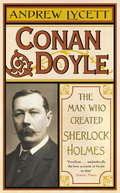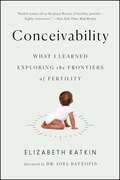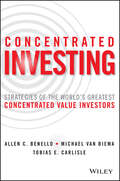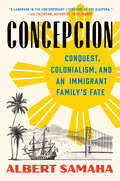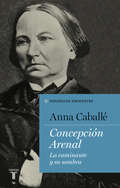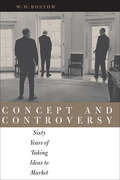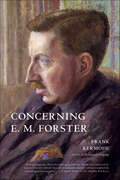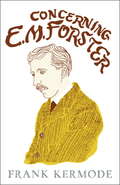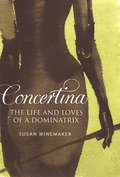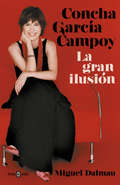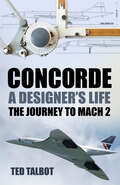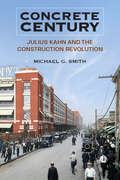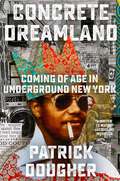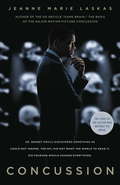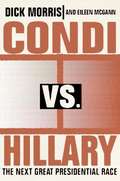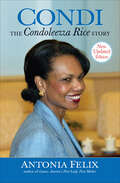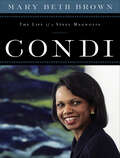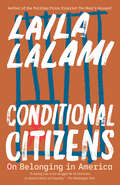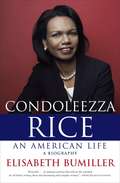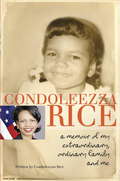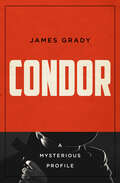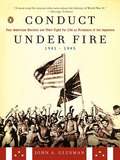- Table View
- List View
Conan Doyle: The Man Who Created Sherlock Holmes
by Andrew LycettGround-breaking biography of the creator of fiction's best loved detectiveThough Sir Arthur Conan Doyle's name is recognised the world over, for decades he was overshadowed by his creation, Sherlock Holmes - one of literature's most enduring characters. Conan Doyle was a man of many contradictions. Romantic, energetic, idealistic and upstanding, he could also be selfish and foolhardy. Lycett assembles the many threads of Conan Doyle's life, including the lasting impact of his domineering mother and his alcoholic father; his affair with a younger woman while his wife lay dying; and his fanatical pursuit of scientific data to prove and explain various supernatural phenomena.Lycett combines access to new material with assiduous research and penetrating insight to offer the most comprehensive, lucid and sympathetic portrait yet of Conan Doyle's personal journey from student to doctor, from world-famous author to ardent spiritualist.
Conceivability: What I Learned Exploring the Frontiers of Fertility
by Elizabeth KatkinPart memoir, part guide, this personal and deeply informative account of one woman’s gripping journey through the global fertility industry in search of the solution to her own “unexplained infertility” exposes eye-opening information about the medical, financial, legal, scientific, emotional and ethical issues at stake.Although conception may seem like a simple biological process, this is often hardly the case. While many would like to have children, the road toward conceiving and maintaining a pregnancy can be unexpectedly rocky and winding. Lawyer Elizabeth Katkin never imagined her quest for children would ultimately involve seven miscarriages, eight fresh IVF cycles, two frozen IVF attempts, five natural pregnancies, four IVF pregnancies, ten doctors, six countries, two potential surrogates, nine years, and roughly $200,000. Despite her three Ivy League degrees and wealth of resources, Katkin found she was woefully undereducated when it came to understanding and confronting her own difficulties having children. Shattered by her inability to get and stay pregnant, Katkin surprised even herself by her determination to keep trying. After being told by four doctors she should give up, but without an explanation as to what exactly was going wrong with her body, Katkin decided to look for answers herself. The global investigation that followed revealed that approaches to the fertility process taken in many foreign countries are vastly different than those in the US and UK. In Conceivability, Elizabeth Katkin, now a mother of two, shares her fertility journey. Part memoir, part practical guide—with a foreword by founder of New York Fertility Services Dr. Joel Batzofin—Conceivability sheds light on the often murky and baffling world of conception science, presenting a shocking exposé into the practical and emotional journey toward creating a happy family. Armed with a wealth of knowledge from her years-long fertility struggle, as well as stories from other women and couples, Katkin bravely offers a look inside one of the most difficult, painful, rewarding, and loving journeys a woman can take.
Conceived in Liberty: Joshua Chamberlain, William Oates, and the American Civil War
by Mark PerryDiscussion of the Civil War with an emphasis on Gettysburg.
Concentrated Investing: Strategies of the World's Greatest Concentrated Value Investors
by Tobias E. Carlisle Allen C. Benello Michael Van BiemaDiscover the secrets of the world's top concentrated value investors Concentrated Investing: Strategies of the World's Greatest Concentrated Value Investors chronicles the virtually unknown--but wildly successful--value investors who have regularly and spectacularly blown away the results of even the world's top fund managers. Sharing the insights of these top value investors, expert authors Allen Benello, Michael van Biema, and Tobias Carlisle unveil the strategies that make concentrated value investing incredibly profitable, while at the same time showing how to mitigate risk over time. Highlighting the history and approaches of four top value investors, the authors tell the fascinating story of the investors who dare to tread where few others have, and the wildly-successful track records that have resulted. Turning the notion of diversification on its head, concentrated value investors pick a small group of undervalued stocks and hold onto them through even the lean years. The approach has been championed by Warren Buffett, the best known value investor of our time, but a small group of lesser-known investors has also used this approach to achieve outstanding returns. Discover the success of Lou Simpson, a former GEICO investment manager and eventual successor to Warren Buffett at Berkshire Hathaway Read about Kristian Siem, described as "Norway's Warren Buffett," and the success he has had at Siem Industries Concentrated Investing will quickly have you re-thinking the conventional wisdom related to diversification and learning from the top concentrated value investors the world has never heard of.
Concepcion: An Immigrant Family's Fortunes
by Albert Samaha&“Absolutely extraordinary...A landmark in the contemporary literature of the diaspora.&” —Jia Tolentino, author of Trick MirrorA journalist's powerful and incisive account of the forces steering the fate of his sprawling Filipino American family reframes how we comprehend the immigrant experienceNearing the age at which his mother had migrated to the US, part of the wave of non-Europeans who arrived after immigration quotas were relaxed in 1965, Albert Samaha began to question the ironclad belief in a better future that had inspired her family to uproot themselves from their birthplace. As she, her brother Spanky—a rising pop star back in Manila, now working as a luggage handler at San Francisco airport—and others of their generation struggled with setbacks amid mounting instability that seemed to keep prosperity ever out of reach, he wondered whether their decision to abandon a middle-class existence in the Philippines had been worth the cost.Tracing his family&’s history through the region&’s unique geopolitical roots in Spanish colonialism, American intervention, and Japanese occupation, Samaha fits their arc into the wider story of global migration as determined by chess moves among superpowers. Ambitious, intimate, and incisive, Concepcion explores what it might mean to reckon with the unjust legacy of imperialism, to live with contradiction and hope, to fight for the unrealized ideals of an inherited homeland.
Concepción Arenal: La caminante y su sombra
by Anna CaballéLa biografía definitiva de la madre del feminismo español. De una inteligencia fuera de lo común, Concepción Arenal fue la pensadora española más importante, original y adelantada a su tiempo del siglo XIX, y la de mayor proyección internacional. Dedicó su vida a la defensa de la mujer, la reforma penal y la causa obrera. Esta biografía reconstruye por primera vez su trayectoria vital, sus aspiraciones y sus aciertos. Al igual que ocurre con la vida de Goethe, su biografía se podría dividir en dos épocas muy marcadas: una juventud nerviosa, sensible y arrogante, con dificultades para encontrar el equilibrio entre la razón y el temperamento, y una madurez donde la escritora, pensadora y activista se atrevería a grandes cosas. Su matrimonio la ayudó a canalizar su extraordinario vitalismo, pero la muerte temprana de su marido potenció las sombras que viajaban con ella: un íntimo sentimiento de desdicha que Arenal proyectaría en el mundo que la rodeaba. Sin embargo, eso no menoscabó su defensa de los más necesitados y sus ansias de mejorar la sociedad, lo que la llevó al límite de sus fuerzas. Pocos la escucharon, y menos todavía la leyeron. Sin embargo, su voz, que ella percibía perdida en el desierto, estéril, fue la más poderosa de su siglo.
Concept and Controversy: Sixty Years of Taking Ideas to Market
by Rostow W. W.A trusted advisor to Presidents Eisenhower, Kennedy, and Johnson and one of America's leading professors of economic history, W. W. Rostow has helped shape the intellectual debate and governmental policies on major economic, political, and military issues since World War II. In this thought-provoking memoir, he takes a retrospective look at eleven key policy problems with which he has been involved to show how ideas flow into concrete action and how actions taken or not taken in the short term actually determine the long run that we call "the future."
Concerning E. M. Forster
by Frank KermodeA major reassessment of the great English novelistThis impressive new book by the celebrated British critic Frank Kermode examines hitherto neglected aspects of the novelist E. M. Forster's life and work. Kermode is interested to see how it was that this apparently shy, reclusive man should have claimed and kept such a central position in the English writing of his time, even though for decades he composed no fiction and he was not close to any of his great contemporaries—Henry James, Ford Madox Ford, Joseph Conrad, James Joyce.Concerning E. M. Forster has at its core the Clark Lectures that Kermode gave at Cambridge University in 2007 on the subject of Forster, eighty years after Forster himself gave those lectures, which became Aspects of the Novel. Kermode reappraised the influence and meaning of that great work, assessed the significance of Forster's profound musicality (Britten thought him the most musical of all writers), and offered a brilliant interpretation of Forster's greatest work, A Passage to India. But there is more to Concerning E. M. Forster than that. Thinking about Forster vis-àvis other great modern writers, noting his interest in Proust and Gide and his lack of curiosity about American fiction, and observing that Forster was closest to the people who shared not his literary interests or artistic vocation but, rather, his homosexuality, Kermode's book offers a wise, original, and persuasive new portrait not just of Forster but of twentieth-century English letters.
Concerning E.M. Forster
by Frank KermodeA major reassessment of the one of the greatest English novelist of the twentieth century, from celebrated critic Sir Frank Kermode.CONCERNING E.M. FORSTER is a rich, varied and original portrait of a literary great. When Sir Frank Kermode delivered the Clark Lectures at Cambridge University, he chose E.M. Forster as his subject; these lectures form the core of this book. Kermode reappraises the influence and meaning of Forster's oeuvre, offering a fascinating interpretation of his most celebrated work, A PASSAGE TO INDIA.There follows a series of interweaving discussions that bring to life diverse topics - Empire, class, poverty, the condition of the novel, the role of the artist - but always return to our enigmatic subject. Kermode also reflects on Forster's considerable talent and shortcomings, places him within a wider social context, and casts spotlight on his contemporaries, presenting a unique panorama of twentieth-century English literature.
Concerning E.M. Forster
by Sir Frank KermodeA major reassessment of the one of the greatest English novelist of the twentieth century, from celebrated critic Sir Frank Kermode.CONCERNING E.M. FORSTER is a rich, varied and original portrait of a literary great. When Sir Frank Kermode delivered the Clark Lectures at Cambridge University, he chose E.M. Forster as his subject; these lectures form the core of this book. Kermode reappraises the influence and meaning of Forster's oeuvre, offering a fascinating interpretation of his most celebrated work, A PASSAGE TO INDIA.There follows a series of interweaving discussions that bring to life diverse topics - Empire, class, poverty, the condition of the novel, the role of the artist - but always return to our enigmatic subject. Kermode also reflects on Forster's considerable talent and shortcomings, places him within a wider social context, and casts spotlight on his contemporaries, presenting a unique panorama of twentieth-century English literature.
Concertina: An Erotic Memoir of Extravagant Tastes and Extreme Desires
by Susan WinemakerSusan Winemaker has lived a life that many women secretly desire, but few admit to...Concertina is the tale of a young chef who abandons her life in the restaurant kitchens of London to satisfy an appetite of a different kind and become one of the most well-known and respected dominatrixes on the city's S&M scene. This is a delicious memoir from Susan Winemaker that spans five years, employs all the tools of her various trades -- copper bowls, tarte pans, nipple clamps, rubber panties, and, of course, the finely-made leather whip - to take the reader inside the world of sadomasochism and its players. Pleasure comes in a variety of flavors and Winemaker is unflinching in the description of her clients' desires from bondage and beating to cross-dressing, humiliation and beyond. The only thing that's off-limits is love, but of course, love always intrudes, even in the life of a successful dominatrix. She falls in love with Adam - a high-powered, beautifully-muscled, buttoned-down City executive - addicted to the extreme physical sensations only Susan can give him. And, in response, Susan becomes addicted to a feeling she never had for any of her other clients. Is it love or lust? As they take their games of erotic exploration out of the dungeon and into their everyday lives, the consequences of falling in love and removing the bonds of the dungeon exact their price and Susan ends her journey somewhat the wiser about herself - both in the bedroom and the kitchen. Concertina is a smart, stylish, witty and eloquent exploration of one woman's journey and obsession that will leave readers questioning their own appetites and desires.
Concertina: The Life and Loves of a Dominatrix
by Susan WinemakerWhat happens when a professional chef becomes a dominatrix, swapping the heat of the kitchen for the intensity of a dungeon? A memoir in three parts, Concertina spans five years of the author's life as she makes the extraordinary transition from culinary expert to professional dominatrix. Taking the reader into the secret, hidden world of suburban sado-masochism, Winemaker introduces us to a fascinating array of colourful characters, before she breaks the code of domination: falling in love with a client. Honest, brave and beautifully written, Concertina is a memoir that finds passion and tenderness in the most unlikely places.
Concha García Campoy: La gran ilusión
by Miguel DalmauCon motivo del quinto aniversario de la muerte de una de las periodistas más queridas de nuestro país, esta biografía autorizada es un apasionante y muy entretenido relato de su vida. A los cinco años de su muerte, la figura de Concha García Campoy sigue viva en el recuerdo de todos nosotros. Desde su aparición en los Informativos de TVE a mediados de los años ochenta, procedente de su querida Ibiza, hasta su último programa en un magacín, la periodista se mantuvo en la cumbre durante tres décadas, desarrollando una carrera excepcional caracterizada por el máximo rigor, la cercanía con el público y la independencia. Pero tras esa trayectoria coronada por el éxito, había una mujer de origen humilde cuya infancia estuvo marcada por la tragedia. Este libro, escrito por uno de los biógrafos más solventes del país, cuenta la apasionante historia de una mujer de nuestro tiempo -amable, generosa, sencilla, divertida-, y aborda libremente aspectos íntimos muy poco conocidos de su vida amorosa y profesional. Para ello ha contado con el valioso testimonio de su familia; de sus parejas; de sus grandes amigas, Ángeles Caso, María Escario, Elena Sánchez y Olga Viza, entre otras, así como compañeras de trabajo y personas de su entorno, donde aparecen figuras tan dispares como Alfonso Guerra, Mariano Rajoy, Juan Cruz, Iñaki Gabilondo, Luis del Olmo, Manuel Campo Vidal, Fernando Delgado, David Trueba, Santiago Segura o Pilar Eyre. Todas ellas se dan cita en esta biografía, que cautiva al instante al lector, porque nos devuelve con toda su luz a una mujer que dedicó gran parte del tiempo a vivir con gozo y a transmitir esa alegría a los demás. El libro incluye también fragmentos del Diario personal de la periodista donde se sincera a corazón abierto hablando de sus sentimientos más profundos y de su heroica lucha contra el cáncer. Al final la enseñanza que Concha García Campoy nos transmite es inolvidable: «Es bueno sentir, sufrir, querer, reaccionar a lo que te da la vida. Eso es estar vivo». Sus amigos hablan de ella...«Era una matriarca. Le encantaba proteger. No dejaba a nadie tirado. Siempre estaba pendiente de todo el mundo.» Ángeles Caso «Su atractivo es de naturaleza estival, y tiene un componente mediterráneo muy acusado. [...] Ella nos mira y se comporta como si viviera en otro mundo, más feliz y risueño.»Juan Marsé «Ella tenía una virtud como periodista que a mi juicio resaltaba sobre todo lo demás: era una persona que escuchaba a quien estaba entrevistando, le oía, y sus preguntas venían precisamente porque te estaba escuchando.»Alfonso Guerra «La aportación de Concha fue extraordinaria porque hizo una radio en tecnicolor. Me refiero al tecnicolor de la nueva sociedad española.»Iñaki Gabilondo «No hacía distinción de clases sino todo lo contrario. Venía de abajo y le gustaba sentirse de abajo, aunque circulaba por arriba.»Manuel Campo Vidal «A lo largo de su vida Concha mantuvo una independencia total, sin veleidades ni concesiones.»Luis Del Olmo «Tenía la cabeza sobre los hombros. No hacía nada que pudiera romper la estabilidad de los otros.»Olga Viza «Merece la pena escribir una novela para que te entreviste Concha García Campoy.»Javier Tomeo «Yo creo que Concha sintió enseguida que Andrés Vicente Gómez sacaba lo mejor de ella, y él sintió que ella sacaba lo mejor de él. Ésa fue una de las claves de su gran historia de amor.»Luis Alegre «Era la mejor anfitriona que he visto nunca, pero no sólo con nosotros sino con mucha gente.»Santiago Segura «Concha era nuestra novia soñada.»David Trueba
Concorde, A Designer's Life: The Journey to Mach 2
by Ted TalbotDo you remember the time we used to do New York in three hours?Even twenty years after its final flight, Concorde remains the pinnacle of aviation design. The aircraft is still unmatched, which has led to a vast swathe of material being written about the aeroplane itself. However, relatively little has been said about the people who designed it.Concorde, A Designer’s Life is an autobiography peppered with anecdotes from the team, humorous life stories and several ‘technibits’, all covering the design period of Concorde. Ted Talbot, who began his career at BAC as an aerodynamicist and later became chief design engineer, has combined the technical narrative with personal and family reminiscences to remind the reader that engineers have lives too.The path to Mach 2 was bumpy, with threats of cancellation and opposition from the Americans and the Russians, but this generally indicated to the Concorde team that they were on the right path! This informative, witty and thoroughly enjoyable peek into an unusual life is a valuable addition to any bookshelf.
Concrete Century: Julius Kahn and the Construction Revolution
by Michael G SmithAt the turn of the 20th century, industrial manufacturing was expanding dramatically while factory buildings remained fire-prone relics of an earlier age. That is, until a 28-year-old civil engineer finally achieved what engineers around the world had unsuccessfully attempted. Working in his brother’s basement in Detroit, Julius Kahn invented the first practical and scientific method of reinforcing concrete with steel bars, which finally made it possible to construct strong, fireproof buildings. After Kahn founded a company in 1903 to manufacture and sell his reinforcement bars, his system of construction became the most widely used throughout the world. Drawing upon Kahn’s personal correspondence, architectural drawings, company records, and contemporary news and journal articles, Michael G. Smith reveals how this man—whose family had immigrated to the US to escape antisemitism in Germany—played an important role in the rise of concrete. Concrete not only turned the tide against widespread destruction of buildings by fire, it also paved the way for our modern economy. Concrete Century will delight readers intrigued by architecture and construction technology alike with the true origin story of modern concrete buildings.
Concrete Dreamland: Coming of Age in Underground New York
by Patrick DougherFrom an award-winning artist who was featured in Humans of New York comes a bold personal narrative about overcoming family trauma, addiction, poverty—and forging a creative life in the greatest city in the world. Born in Brooklyn in 1963, Patrick Dougher grew up in some of the most turbulent and culturally impactful periods of NYC's history. Often neglected as a child by his parents—a father who struggled with alcohol addiction and an overworked mother who struggled to make ends meet—he learned to fend for himself. Now a renowned visual artist, musician, actor and writer, Dougher brings to the page his memories, struggles, personal revelations, and a life intimately tied to the realities of growing up Black and disenfranchised on the streets of one of the most remarkable cities in the world.Concrete Dreamland is tragic and triumphant, gritty and hard, poetic and outrageously funny. Told in Dougher's brutally raw and courageously honest voice, these stories act as snapshots of a life lived in extremes: from gangsters to God, street style to sexuality, to recovery from drug addiction and alcoholism. He tells of his adventures as a pre-hip hop &“hard rock' and an original Black punk rocker surviving during the dangerous days of the crack and AIDS epidemic in NYC, while also sharing tales of racism, homelessness, and his many brushes with fame and death. Audacious, unique, and moving, Concrete Dreamland is an unforgettable story of addiction, redemption, and life on the streets of a vanishing New York.
Concussion
by Jeanne Marie Laskas<P>Soon to be a major motion picture starring Will Smith, Concussion is the riveting, unlikely story of Dr. Bennet Omalu, the pathologist who made one of the most significant medical discoveries of the twenty-first century, a discovery that challenges the existence of America's favorite sport and puts Omalu in the crosshairs of football's most powerful corporation: the NFL. <P>Jeanne Marie Laskas first met the young forensic pathologist Dr. Bennet Omalu in 2009, while reporting a story for GQ that would go on to inspire the movie Concussion. Omalu told her about a day in September 2002, when, in a dingy morgue in downtown Pittsburgh, he picked up a scalpel and made a discovery that would rattle America in ways he'd never intended. <P>Omalu was new to America, chasing the dream, a deeply spiritual man escaping the wounds of civil war in Nigeria. The body on the slab in front of him belonged to a fifty-year-old named Mike Webster, aka "Iron Mike," a Hall of Fame center for the Pittsburgh Steelers, one of the greatest ever to play the game. After retiring in 1990, Webster had suffered a dizzyingly steep decline. Toward the end of his life, he was living out of his van, tasering himself to relieve his chronic pain, and fixing his rotting teeth with Super Glue. <P>How did this happen?, Omalu asked himself. How did a young man like Mike Webster end up like this? The search for answers would change Omalu's life forever and put him in the crosshairs of one of the most powerful corporations in America: the National Football League. <P>What Omalu discovered in Webster's brain--proof that Iron Mike's mental deterioration was no accident but a disease caused by blows to the head that could affect everyone playing the game--was the one truth the NFL wanted to ignore. <P> Taut, gripping, and gorgeously told, Concussion is the stirring story of one unlikely man's decision to stand up to a multibillion-dollar colossus, and to tell the world the truth. <P><b>A New York Times Bestseller</b>
Condi vs. Hillary
by Dick Morris Eileen McgannWho will be president in 2008? Many believe that the White House is Hillary Clinton's to lose. As long-time strategists Dick Morris and Eileen McGann reveal in Condi vs. Hillary, however, Hillary's plans for higher office are vulnerable to a challenge from a most unexpected quarter: the Bush administration's secretary of state and former national security advisor, Condoleezza Rice. Rice is the only figure on the national scene who has the credentials, the credibility, and the charisma to lead the GOP in 2008. And, as this first book on the subject demonstrates, a race between these two commanding, but very different, women is a very real possibility -- and would inevitably prove one of the most fascinating and important races in American history. Blending insider insight and political foresight, Condi vs. Hillary surveys the strengths and weaknesses of the two candidates, finding persuasive clues about what we might expect from each of them as a chief executive. It traces their very different childhoods -- Hillary Rodham's in unchallenging suburban comfort, Condi Rice's in Birmingham, Alabama, during the civil rights era -- and finds in each the roots of their latter-day selves. It explores their career in public life -- Hillary's as an ambitious liberal who attached herself to a governor on the rise, Condi's as a woman of broad and deep talents who has earned her own way. It turns a discerning eye on how each has spent her time in government, contrasting Condi's growth and maturation in office with Hillary's record of underachievement as both first lady and senator from New York. And it reveals how a draft-Condi movement could sweep the secretary of state into the presidency even as she forgoes campaigning to address her responsibilities as secretary of state. America, in short, may be on the verge of a perfect storm of twenty-first-century politics, pitting two of America's most popular -- and controversial -- women against each other, and offering Americans a choice between fulfilling the ambitions of one of our most polarizing figures . . . or changing history by electing not just the first woman, but also the first African American woman, to lead the free world into the future.
Condi: The Condoleezza Rice Story
by Antonia FelixThis is the remarkable and galvanizing true story of Condoleezza Rice—sixty-sixth United States Secretary of State under President George W. Bush, who once said about his close confidante, "Dr. Rice is not only a brilliant person, she is an experienced person. . . . America will find that she is a wise person."With the current release of her own long-awaited memoir, Condoleezza Rice is more fascinating than ever. Drawing from exclusive interviews with dozens of friends, relatives, colleagues, and teachers, as well as scores of previous articles and interviews, this thoroughly researched and detailed biography paints a compelling portrait of a born leader of resolute character who broke all barriers to excel as a black woman in an arena usually dominated by white men.From her childhood in segregated Birmingham, Alabama, where her parents fostered a love of learning and excellence at an early age, to her calling to the arts as an outstanding classical pianist, to her rise through the political ranks to the halls of power in Washington, D.C., Condi is a revealing look at the most gifted and influential woman in American political history.
Condi: The Life of a Steel Magnolia
by Mary Beth BrownAn in-depth look at the life, faith, and achievements of one of America’s most fascinating women.“One day I’ll be in that house,” said ten-year-old Condoleezza Rice as she gazed across the White House’s expansive front lawn.Of course, Condi made good on that promise. With poise and gracefulness—combined with an iron will and determination—rarely seen in Washington, Rice has become one of the most iconic and influential figures on the world stage. This is her story.Condi provides an in-depth study of the life, faith, and achievements of one of America’s most fascinating women. From her humble beginnings in segregated Alabama to her academic career, from her first days in Washington to her appointment as Secretary of State and beyond, Condi investigates Rice’s rise to political prominence. Drawing from in-depth research, Mary Beth Brown explores how Condi’s parents, mentors, faith, and defining moments have helped her grow into a position of power and global influence.Here is a story of inspiration, of principle, and of the limitless opportunities for those who pursue their dreams with unfailing hope and dogged determination.
Conditional Citizens: On Belonging in America
by Laila LalamiWhat does it mean to be American? <P><P>In this starkly illuminating and impassioned book, Pulitzer Prize–finalist Laila Lalami recounts her unlikely journey from Moroccan immigrant to U.S. citizen, using it as a starting point for her exploration of the rights, liberties, and protections that are traditionally associated with American citizenship. Tapping into history, politics, and literature, she elucidates how accidents of birth—such as national origin, race, and gender—that once determined the boundaries of Americanness still their shadows today. Lalami poignantly illustrates how white supremacy survives through adaptation and legislation, with the result that a caste system is maintained that keeps the modern equivalent of white male landowners at the top of the social hierarchy. <P><P>Conditional citizens, she argues, are all the people with whom America embraces with one arm and pushes away with the other. Brilliantly argued and deeply personal, Conditional Citizens weaves together Lalami’s own experiences with explorations of the place of nonwhites in the broader American culture.
Condoleezza Rice: A Biography
by Elisabeth BumillerCondoleezza Rice, one of most powerful and controversial women in the world, has until now remained a mystery behind an elegant, cool veneer. In this stunning new biography, a "New York Times" reporter peels back the layers and presents a revelatory portrait of the first black female secretary of state.
Condoleezza Rice: A Memoir of My Extraordinary, Ordinary Family and Me
by Condoleezza RiceIn this captivating memoir for young people, looking back with candor and affection, Condoleezza Rice evokes in rich detail her remarkable childhood.Her life began in the comparatively placid 1950s in Birmingham, Alabama, where black people lived in a segregated parallel universe to their white neighbors. She grew up during the violent and shocking 1960s, when bloodshed became a part of daily life in the South. Rice's portrait of her parents, John and Angelena, highlights their ambitions and frustrations and shows how much they sacrificed to give their beloved only child the best chance for success. Rice also discusses the challenges of being a precocious child who was passionate about music, ice skating, history, and current affairs. Her memoir reveals with vivid clarity how her early experiences sowed the seeds of her political beliefs and helped her become a vibrant, successful woman.Condoleezza Rice: A Memoir of My Extraordinary, Ordinary Parents and Me is a fascinating and inspirational story for young people.From the Hardcover edition.
Condor: An E-book Original Story (Mysterious Profiles #25)
by James GradyDecades after his adventure in the classic Six Days of the Condor, the eponymous spy reflects on his life while awaiting his next target in this tense novella. Ronald Malcolm, codename Condor, is still in the spy game. He may be older now, but in a world where hardly anybody sees anybody, nobody sees old. He&’s the perfect choice to sit in New York City&’s Penn Station and wait for what he calls &“the killing train.&” And while he waits for someone to take a life, he reflects on his own life. He wonders what has brought him to this moment. He looks back over memories of his childhood, his recruitment to the CIA, and that bloody day at the American Literary Historical Society that changed everything for him. But he must be careful not to get too lost on memory lane. The clock is ticking, and targets are on the move. He can&’t afford to get caught with his head in the clouds . . .Praise for James Grady &“A chilling novel of top security gone berserk . . . Breakneck . . . Not a slow minute.&” —Library Journal on Six Days of the Condor &“Grady&’s writing has changed dramatically over the years, evolving into a literary, impressionistic style . . . [It] is a perfect fit for the aging, unhinged, yet still-lethal Condor. This is an author writing at the top of his, or anyone else&’s, game.&” —Publishers Weekly (starred review) on Condor: The Short Takes
Conduct Under Fire
by John A. GlusmanThe fierce, bloody battles of Bataan and Corregidor in the Philippines are legendary in the annals of World War II. Those who survived faced the horrors of life as prisoners of the Japanese. In Conduct Under Fire, John A. Glusman chronicles these events through the eyes of his father, Murray, and three fellow navy doctors captured on Corregidor in May 1942. Here are the dramatic stories of the fall of Bataan, the siege of "the Rock," and the daily struggles to tend the sick, wounded, and dying during some of the heaviest bombardments of World War II. Here also is the desperate war doctors and corpsmen waged against disease and starvation amid an enemy that viewed surrender as a disgrace. To survive, the POWs functioned as a family. But the ties that bind couldn't protect them from a ruthless counteroffensive waged by American submarines or from the B-29 raids that burned Japan's major cities to the ground. Based on extensive interviews with American, British, Australian, and Japanese veterans, as well as diaries, letters, and war crimes testimony, this is a harrowing account of a brutal clash of cultures, of a race war that escalated into total war. Like Flags of Our Fathers and Ghost Soldiers, Conduct Under Fire is a story of bravery on the battlefield and ingenuity behind barbed wire, one that reveals the long shadow the war cast on the lives of those who fought it.
